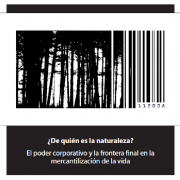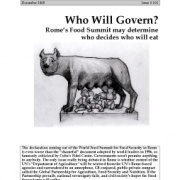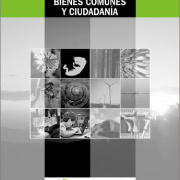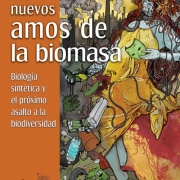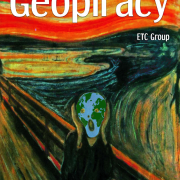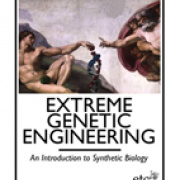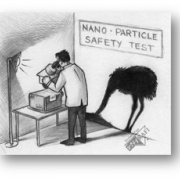Las secciones siguientes se ofrecen definiciones, descripciones y enlaces a las páginas dedicadas a los temas.
Todos los temas
Vigilando al poder
Corporate Concentration
Concentration in corporate power is the defining feature of today's global economy, with profound implications for livelihoods, well-being, the environment and human rights. ETC Group has long monitored the "Gene Giants" (who aggregate control over seeds, agrochemicals, pharmaceuticals, biotechnology, genomics and food processing and retailing). Today many of the same large corporations are touting the use of new technologies - including genomics, nanotechnology and synthetic biology - to transform biomass into high-value products or to manufacture materials "from the bottom up." They are moving from being - 'gene giants' to 'biomass-ters' or even 'matter moguls.'
International Governance
As global crises of food, finance and the environment converge and powerful new technologies accelerate far-reaching social and ecological change, the need has never been stronger for coordinated and equitable global decison-making. Unfortunately, at the same moment, multilateral institutions, such as agencies of the United Nations, are experiencing a crisis of legitimacy as power moves to the international financial institutions and the corporations that structure the global economy. ETC Group has been active in various UN and other international and regional fora for the past thirty years, pushing for greater involvement of farmers, civil society and social movements in decisions that affect them, proposing new treaties and governance frameworks and warning against the corporate takeover of our international institutions.
Militarism & Dissent
Powerful new technologies such as biotechnologies, nano-scale technologies or geoengineering techniques are 'dual use,' in that they can also be applied for purposes of warfare, surveillance and social control. In practice, much of the initial funding and impetus for developing such technologies often come from the military or from governments looking to control dissent. This topic includes ETC Group's research into biological warfare -- defined as the deliberate use of microorganisms or toxins derived from living organisms to induce death or disease in humans, animals or plants.
Patents & Biopiracy
Biopiracy, a term originally coined by ETC Group, refers to the appropriation of the knowledge and genetic resources of farming and indigenous communities by individuals or institutions that seek exclusive monopoly control (patents or intellectual property) over these resources and knowledge. ETC Group believes that intellectual property is predatory on the rights and knowledge of farming communities and indigenous peoples. Through nanotechnology- and synthetic biology-related patents, intellectual property claims are now being extended to elements of the periodic table and to key metabolic pathways involved in cellular functioning (and resulting in natural products with high commercial value).
Terminator & New Enclosures
The genetic modification of plants to produce sterile seeds (dubbed "Terminator" technology by ETC Group) has been widely condemned as an immoral application of biotechnology. If commercialized, Terminator would prevent farmers from re-using seed from their harvest, forcing them to return to the commercial seed market for every planting. But Terminator is just one of a range of technological and legal strategies that corporations are developing to exercise monopoly control over the stuff of life -- strategies that ETC Group refers to as "New Enclosures." Non-patent approaches, such as genetic trait control, satellite surveillance, and digital rights management software could be used to impose new monopolies beyond intellectual property as the predominant means of corporate control in the 21st century.
The Bioeconomy
The 'New Bioeconomy' describes the idea of a new industrial order that relies on biologically-based materials, technologies and 'services.' It is a term invented by the biotechnology industry but increasingly adopted by policymakers, technologists and global energy, forestry, agribusiness and chemical companies. They are now collaborating to construct this vision of a hi-tech, 'green' future using techniques such as synthetic biology and nanotechnology to transform living 'biomass' into fuels, chemicals and power. However, what is sold as a 'green' switch from fossil fuels to plant-based production is, in fact, a red-hot resource grab on the lands, livelihoods, knowledge and resources of the global South, where 86% of all biomass is located. The Bioeconomy is now threatening biodiversity, fueling land grabs and enabling new corporate claims on nature.
Monitoreando la tecnología
Climate & Geoengineering
Geoengineering is the intentional, large-scale technological manipulation of the Earth’s systems, often discussed as a techno-fix for combating climate change. Climate geoengineering technologies can be divided into three broad areas: so-called solar radiation management (reflecting sunlight to space), greenhouse gas removal and sequestration and weather modification.
Geoengineering can refer to a wide range of techniques, including: blasting sulphate particles into the stratosphere or 'whitening' clouds to reflect the sun’s rays; dumping iron particles in the oceans to nurture CO2 -absorbing plankton; firing silver iodide into clouds to produce rain or genetically engineering crops so their foliage can better reflect sunlight.
ETC Group opposes geoengineering and other false solutions to climate change (e.g., proprietary, genetically-engineered 'climate-ready' crops ) and supports peasant-led agroecological responses to the climate crisis.
Genomics & Biotechnology
ETC Group has tracked developments in the genetic engineering of plants, animals and microorganisms since the early 1980s and tracked the transition of the biotechnology industry into a broader 'life sciences' industry spanning agriculture, pharmaceuticals, energy and chemicals production. Today, biotechnology encompasses a variety of techniques that involve the use and manipulation of living organisms to make commercial products (including cell and tissue culture, recombinant DNA technology and synthetic biology). Underlying the commercial manipulation of life are ever more powerful genomics technologies (gene-mapping) that enable companies to quickly 'read,' store and digitally analyze genetic information -- either of single organisms or entire ecosystems (known as metagenomics). ETC Group (then RAFI) was one of the first organizations to warn of the downside of genetic engineering of crops and livestock and has since kept an eye on developments in human biotech, synthetic biology, biowarfare and industrial biotech.
Human Enhancement
Human Enhancement refers to attempts to 'upgrade' or extend human physical and cognitive abilities through technological means. These range from the use of nanotechnology to create prosthetic body parts and neuro-technologies for mind-machine interfaces to the use of gene therapy and human genetic engineering to 'cure' disabilities or create super-soldiers. Enhancement technologies raise significant ethical issues about the social and human rights of marginalized people who will be targeted, including disabled people, indigenous people and women. Corporate interest in 'enhancement' is ushering in a profitable new market for pharmaceutical and medical companies moving beyond treating the sick to 'improving' the healthy (and wealthy).
Nanotechnology
Nanotechnology refers to the manipulation of matter on the scale of the nanometer (one billionth of a meter). Nanoscale science operates in the realm of single atoms and molecules. At present, commercial nanotechnology involves materials science (i.e. researchers have been able to make materials that are stronger and more durable by taking advantage of property changes that occur when substances are reduced to nanoscale dimensions). As nanoscale molecular self-assembly becomes a commercial reality, nanotech will move into conventional manufacturing and it is already changing healthcare, food and drug production. Nanotechnology involves profound social , military and environmental risks, with new nanomaterials potentially threatening raw material economies of the south and posing new health risks to workers and the public at large.
Synthetic Biology
Synthetic biology brings together engineering and the life sciences in order to design and construct new biological parts, devices and systems that do not currently exist in the natural world or to tweak the designs of existing biological systems. Synthetic biologists, engaged in a kind of extreme genetic engineering, hope to construct designer organisms that perform specific tasks such as producing biofuels or other high-value compounds.
Technology Assessment
International efforts to address the food, energy and climate crises tend to regard technology as an important part of the solution. This optimism about technology also prevails in debates around the Green Economy and international environmental governance. And of course technology does hold some potential solutions to some important problems. However, two decades of accelerating technological development and deployment, in the context of massive trade and investment liberalization, has left the globe in far worse straits than it was when the very concept of sustainable development was in its infancy. And now, it is time for a technological re-think. New high-risk technologies, ranging from the very small (synthetic biology, nanotechnology) to the very large (geoengineering), are rapidly developing. Their promoters promise that they hold the keys to solving climate change, world hunger, energy shortages and biodiversity loss and the precautionary principle and social and economic impacts are often ignored in the rush to deploy the latest technofix.
Forteleciendo la diversidad
Biodiversity & Cultural Diversity
Biological diversity refers to all living organisms, their genetic material and the ecosystems of which they are a part. It is usually described at three levels: genetic, species, and ecosystem. Biological diversity is the cornerstone of sustainable agriculture and world food security. The loss of cultural diversity (including languages) and traditional knowledge -- of farm communities and indigenous cultures -- is intricately linked to the loss of biological diversity. Indigenous peoples and farming communities are the creators, custodians and continuing innovators of biological knowledge and resources. The UN Convention on Biological Diversity (often referred to as the CBD or Biodiversity Convention) is a legally-binding framework for conservation and sustainable use of biodiversity.
Farmers' Rights & Food Sovereignty
Farmers' Rights, endorsed by FAO in 1989, recognizes that farmers and rural communities have contributed greatly -- and continue to contribute -- to the creation, conservation, exchange and enhancement of genetic resources, and that they should be recognized and strengthened in their work. The ETC Group believes that Farmers' Rights must be recognized at the international level, and that its definition should be expanded by the human rights community as part of the Right to Food. Food sovereignty has largely replaced the more limited and less empowering concept of food security. Food sovereignty refers to the rights of peoples, communities and countries to define their own agricultural labour, fishing, food and land policies which are ecologically, socially, economically and culturally appropriate to their unique circumstances. It includes the true right to food and to produce food, which means that all people have the right to safe, nutritious and cultural appropriate food and to food producing resources and the ability to sustain themselves and their societies. (Source: Practical Action www.practicalaction.org)
Seeds & Genetic Diversity
For more than 30 years, ETC Group (first as RAFI) has monitored technologies and corporate mergers & acquisitions (M&As) related to seeds, the first link in the food chain. Throughout the 1970s, we witnessed petrochemical and pharmaceutical companies (e.g., Royal Dutch/Shell, Occidental Petroleum, Ciba-Geigy, Union Carbide, Upjohn Pharmaceutical) scoop up thousands of small, family-owned seed companies. By the 1980s, a “life industry” had emerged – seeds, agrochemicals, pharmaceuticals (both livestock and human) – which became all the more entangled by the development and commercialisation of proprietary biotechnologies (genetic engineering). Corporate concentration in the commercial seed sector meant a dramatic loss of genetic diversity as companies offered only the most profitable lines of seeds for sale and abandoned the rest. Intellectual property regimes (primarily patents and Plant Breeders’ Rights) soon extended to all biological products and processes, and further rewarded uniformity. With the privatisation of plant breeding, public breeding programs withered, reinforcing corporate consolidation in the seed and agrochemical industry. The late 1990s brought the development of seed sterilization technologies (a. k. a. Terminator), intended to restrict farmers' right to save and replant seed. Today, the world's 10 biggest seed companies control almost three-quarters of the commercial seed market.

